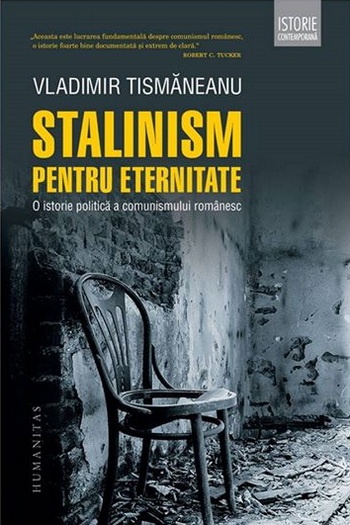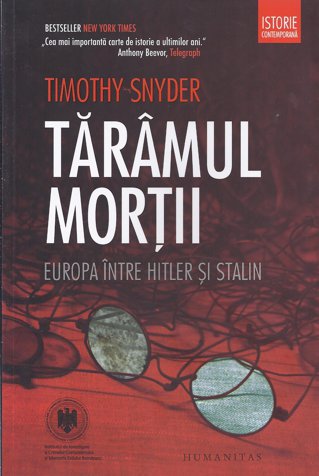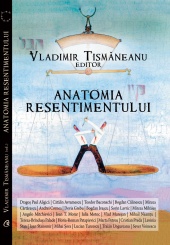Scriind despre Nicu Ceausescu, despre anii de liceu, despre biografiile din Cartierul de Nord, despre Petre Roman si altii, am cautat unele pagini mai vechi, direct legate de aceste teme. Am regasit astfel textul meu intitulat “Dialectical Insomnias”, o combinatie de istorie politica si literatura. Deci, o nuvela situata in acel punct pe care criticul Lionel Trilling il numea “the bloody crossroads where politics and literature meet”. Este o povestire sincopata, scrisa pe mai multe niveluri de timp, cu o multime de trimiteri la dezastrul social, economic, moral al istoriei comuniste din veacul XX. Ma ocup de mai multe cazuri, propun o caracterologie si o fenomenologie a pasiunilor comuniste. In textul de mai jos, doar gandurile celui numit Walter sunt fictive. Restul este istorie, crima, magie, vraja si credinta oarba.
Revolutionary Betrayals
It’s three in the morning in Budapest in October 1956. The sound and the fury of last night’s demonstrations and marches have calmed down, but few people realize that an epoch did come to an end. At the Soviet Embassy work continues at high speed: ambassador Yuri Andropov and his advisor, Viktor Kryuchkov, have a meeting with a Romanian official, hastily dispatched to Budapest by Gheorghiu-Dej on special assignment. His name is Walter Roman. Tall, red-haired, emaciated, with a military composure, speaking perfect Russian, Romanian, German, French, Spanish and Hungarian. The last is actually his mother tongue. He looks as the opposite of the grey apparatchiks of the victorious parties. Walter is himself a survivor of the times of terror. And he knows personally all the important actors of the drama to follow. He belongs to a mystical fraternity, a sect or selfless revolutionary zealots. Individuals may err, the Party, however, is always right. For decades, he has loved the Party the way a deeply religious Jew worships the name of God or a Christian believes in the Gospels. Intensely, ardently, unconditionally, totally. For him, Marxism is the holy writ, pure, honorable, a redemptive way to ultimate bliss. It was in Ufa where he and Ana went to console Dolores for the lossof her son Ruben whi died at Stalingrad. Dolores, eyes of agony, eyes of sorrow. She never recovered after that loss, remained forever a statue of mourning. He remembers vividly the dinner at Dimitrov’s datcha in early 1943, when he and Rakosi clashed over the fate of Transylvania after the liberation by the Red Army. He found Rakosi’s attitude not only arrogant, but totally devoid of Marxist internationalism. If Walter despises and hates something this is chauvinism. The selfish, strident, despicable pettiness of nationalism. He remembers the kids on the street in Oradea shouting silly, heinous slogans against the “Yids”. It was only in the Party that he forgot about his fears, his terrible, insufferable anxieties. Ana did not come, she preferred to let him respond to the angry diatribes of the Hungarian. This had always been Ana’s tactics, to be aloof, to pretend that she was not directly involved. In prison, at Mislea, when the comrades exposed her husband Luximin, Tania’s and Vlad’s father, as a traitor, Ana was silent, but then she voted for his expulsion from the Party. At that moment Luximin was already dead, shot like a mad dog…
Born in 1913 in a Hassidic family in the outskirts of Oradea (Nagyvarad), the young Ernest Neulander joined the communist party in Bucharest, as a student at the Polytechnical School. He was a most active participant in the dialectical debates at the Schuler Dormitory where Jewish students resided. Mihail Iacobi, later known as Florescu, was the president of the Association of Jewish Students. A friend of Lucien Goldmann, the young Neulander did not share with the future French sociologist of literature the doubts about the Moscow show trials. On the contrary, his voice was thunderous at the meeting when Goldmann was expelled from the clandestine party cell. Then, he became a truly trustworthy comrade, writing lead articles for the party underground journals. He went to Czechoslovakia and enrolled in the Polytechnical School in Brno (then called also Brun), a center of international communist networking. In Bucharest he had been engaged to Paula Bessler, a girl born in the Moldavian city of Botosani. With a limping leg, vocal and unswervingly attached to the Party line, Paula was always trying to be right, she wouldn’t listen to anybody once the Party had uttered the truth. Later, she married Herbert Grunstein, a German communist and former member of the “Thalmann” International Brigade. In the 1970s, Grunstein became deputy minister of internal affairs in the police state called the GDR. In 1968, both Paula and Herbert were flaming supporters of the Soviet invasion of Czechoslovakia, an action that he, Walter, deplored. This was the end of their friendship. Walter was close to Josef Pavel, a former International Brigades fighter, victim of the Stalinist purges in the 1950s, appointed by Dubcek minister of internal affairs during the Prague Spring. He fancied himself as a major figure of the international anti-Stalinist Left, a legend he managed to convince his son Pedro to believe in and to defend in spite of all evicence to the contrary. Koestler and Orwell, Sperber and Souvarine, Ruth Fischer and Ignazio Silone, Edmund Wilson and Richard Wright, Victor Serge and Margarete Buber-Neumann, these were the popele who could legitimately be called the voices of the anti-Stalinist international Left. Walter remained friends until the end of his life with Santiago Carrillo, the hypocritical ex-Stalinist who started his political rise as one of the organizers of a political massacre in Madrid, in 1936.
From Brno, he went to Paris where he met Tito, the Croatian communist in charge of organizing the International Brigades. Fascinated with Tito’s imposing composure, he borrowed from the Yugoslav the nom de guerre Walter. From that moment on he became Walter Roman, a strange name combination that made him an embodiment of the Comintern’s supranational army of commissars. There was at least another Walter in Spain, the Polish one, who was later killed, in 1946, by the anticommunist partisans. In the 1950, in Warsaw, Jacek Kuron established a group of young revolutionaries called the “Walterites”, committed to a “true” vision of socialism. As teenagers, Adam Michnik and Irena Grudzinska were Walterites.
In Barcelona, Roman met Erno Gero, and many others who were active in the secret police operations organized by the NKVD general Orlov, who later defected to the West and exposed Stalin’s plot to hijack the Spanish revolution. He also befriended Aleksandar Rankovic, who after 1944 became Yugoslavia’s most feared policeman and Tito’s hatchet man in the attempt to weed out the Stalinists (Cominformists). Another good friend was Veljko Vlahovic who lost a leg in one of the main batttles. During the war, Vlahovic worked for the Yugoslav branch of Radio Moscow. He went back to Yugoslavia where he became the head of the Belgrade party organization. Laszlo, Veljko, Aleksandar, Walter, Renato, Maurice, Mehmet, Constantin, Ernst–they were all soldiers of the Revolution, they were proud “voluntarios internacionales de la libertad”. La fraternite, brotherhood, indeed. The anguishing memory of Ay, Carmela! Years later, Walter liked to quote Miguel de Unamuno: Me duele Espana…
While in Spain, Walter was certainly aware of, if not directly involved in the liquidation of the foco libertario in Catalonia and the assassination of Andres Nin by Gero, Vittori Vidali and their murderous thugs. By all means, he was situated at the opposite of the values cherished by Orwell, the anti-authoritarian socialist. A Central European intellectual who wanted desperately to forget both his ethnic origin and his initial values, Walter steeled himself and became a masterful practitioner of the art of doublethink: always ready to endorse the party line, to explain it, even when his best friends were denounced as despicable renegades, vicious wreckers, and traitors to the cause. The Cause transcended for him any immediate loyalties. Then, he married a Spanish girl, a pact he signed with the nation he had come to identify with in that continuous flight from his roots. They had two children, both born in Russia, after the end of the Civil War and Walter’s adoption of Soviet citizenship. In Moscow he first worked among Hungarian communists, in the late thirties and early forties.
When Ana Pauker arrived following the exchange of prisoners between Stalin and the Romanian government in the summer of 1940, he joined the newly formed exiled nucleus of the Romanian Communist Party. Most of the leaders had been killed during the purges: Eugen Rozvany, his former mentor in Oradea, the lawyer who had worked together with Jeno Varga, the famous academician and Stalin’s economic tutor, author of a manuscript on Fascism that was a piece in his file concocted by the NKVD in 1937, but also David Fabian, the translator of Lenin’s works into Romanian and Sasha Dobrogeanu-Gherea, the son of the patriarch of Romanian Social Democracy. All had perished in the mist of the Gulag and now, when the war between the Axis and the USSR was imminent, Stalin needed a new leadership for Romania’s bleeding revolutionary vanguard. Walter was available, ready to serve the interests of the Communist Mecca. He received a flat at the Hotel Lux, where he met Hortensia, a Spanish communist married to an important activist close to Dolores Ibarruri, La Pasionaria. That was one of the romantic stories of the otherwise macabre Lux lifestyle: Walter and Hortensia left their spouses. Walter adopted Hortensia’s children (Mirela and Raul) and started a new family. Together, in post-war Romania, they had two other children: Pedro and Carmen. After the December 1989 revolution and Ceausescu’s execution on Christmas day, Pedro became the country’s prime minister. But we are still in Budapest, during the ominous night of October 24, 1956.
Walter returned to Romania in 1944 with a Soviet-organized division of Romanian war prisoners. During the war, he had been the head of the Comintern’s Romanian-language radio station, “Free Romania.” He was perhaps the closest collaborator of Ana Pauker, la grande dame of Romanian communism whom he worshipped and cultivated with unsurpassed humility. Ana’s husband, Marcel (called Luximin, theorist of the hunger strike, a romantic revolutionary with close links to Genrikh Yagoda, the secret police chief executed after Bukharin’s trial in March 1938) had been arrested in 1937. It seems that Ana never inquired about her late husband’s fate: close as she was to Molotov and Stalin, she was cautious enough not to antagonize them with unwarranted disquisitions. Like other Comintern survivors, Ana and Walter were powerful because they were silent. Once in Romania, Walter became one of the most active political officers and eventually was appointed chief of the General Staff of the Romanian Army. He established friendly relations with the party leader Gheorghiu-Dej, a consummate Machiavellian with little culture but fabulous power instincts, and was appointed Minister of Communications. But his career came to a dangerous end in 1949, when his former friend Laszlo Rajk, also born in Transylvania, was hanged in Budapest as a Trotskyite and Titoist spy.
Walter and Rajk had known each other since Spain and Rajk had mentioned his Romanian friend’s name in the confessions extorted by Gabor Peter’s torturers. Walter and Hortensia were placed under house arrest and a search for proofs to incriminate him was initiated apparently on orders from Ana Pauker. Walter tried to talk to her, to assure the steeped Stalinist militant that he had never shared Rajk’s heinous plans. He was isolated and despondent. He might have even contemplated suicide. As a pariah he did not represent anything. The sense of his life was to belong to the chapel and now the party was treating him like scum. He wrote letter after letter, implored Dej and Ana to give him a chance to show that whatever his faults he was a dedicated soldier of the party. He tried to approach his Soviet connection, but the wave of anti-Semitism in Stalin’s last years made somebody like Walter unwanted and even embarrassing for the Soviet advisors. A trial was prepared for him.
The godsend came however in June 1952 when Ana lost her seat on the Politburo and was charged with the most hallucinating crimes against the party. Walter knew that his ordeal was over: he could provide Dej and his clique with arguments against the deposed goddess. He, the true communist, had been the victim of Ana’s vicious intrigues: her hatred against him was indeed the proof of her plan to slander all revolutionaries who had been aware of her Zionist propensities. Walter was reinstated into the party and became a zealous propagandist of Dej’s cult. He had to pay his master for having saved him. And he did pay by using all his Soviet connections to convince the Russians that Dej was totally and unconditionally on their side. In June 1953, as the Hungarians engaged in the New Course and Imre Nagy became prime minister, Walter was useful to both Russians and Romanians: he knew Imre bacsi from Moscow, they had had long conversations and they had both been persecuted by Stalinists like Rakosi and Pauker. Walter saw Nagy and became a kind of emissary between the Romanian leaders and the reformist Hungarian premier. No wonder then that he was the man whom both Khrushchev and Dej sent to Budapest to assess the situation during that tragic night of October 24, 1956. He told Nagy bluntly that he was playing with fire. The coutrer-revolution needed to be smashed, ruthlessly, immediately, unsparingly. No illusions were permitted in this respect.

As a former collaborator of the secret police, Walter could talk to the Russians directly and influence their decisions. He knew also Janos Kadar whom he met the next morning and arranged for a regeneration of the communist party, under a new name and with new leaders. Gero was ousted and Walter’s other friends were now in power. Ten days later, he would be again in Budapest, this time to arrange their transportation from the Yugoslav embassy to Romania, where they had been “granted” political asylum. In hact, they were abducted. Friendship for Walter meant what the party decided. I was at a conference in Missisippi, in September 1989, when Miklos Vasarhelyi, the last survivor of the Nagy government, told me: “Yes, I remember Walter, or better said Ernest. He interrogated us in Romania, when we were at the party special residences in Snagov.” Walter did it, together with Iosif Ardeleanu and Nicolae Goldberger – both Hungarian-speaking activists with impeccable credentials in the repressive apparatus. Not that Walter participated in any torture: no, he was different, and the times were different: new methods were used to accomplish the same result, the show trial and the assassination of the heretics on trumped-up charges.
This time, however, the defendants refused to cooperate. Walter had known very well Geza Lozonczy, the soul of the reformist movement, yet he refused to acept his arguments, rejected them as a renegade’s sophistries. When Dome Adler (Iosif Ardeleanu, the head of the Romanian censorship), his old comrade and rival, told him that Geza had committed suicide in the Securitate captivity, Walter remained impassible. Neither was he he shaken when he learned that Jozsef Dudas, the Transylanvian ex-communist, jailed in Romania in the rarly 1950s. resurrected as the head of the Budapest Workers’ Council, was captured, tried, and executed. Years later, he read a book by French ex-communist journalist Dominique Desanti, titled “Les Staliniens”. He was shattered reading the moving pages about Geza but did not see anything to reproach himself. He had done his duty and, after all, hadn’t his friend Imre Mezo, a former Spanish Civil War fighter, the head of the Budapest party organization, been hanged by the enraged rebels? Subjectively, Walter thought, Geza was innocent (he would not admit the same thing about Dudas whom he considered an adventurer). Objectively, however, Losonczy, and Vasarhely, and Nagy, and even the great Marxist thinker Gyorgy Lukacs, were all responsible for the counter-revolutionary debauchery. Maddeningly tormenting thoughts, incurable, dialectical insomnias haunted by the ghosts of the murdered comrades–this was Walter’s predicament.
In June 1958, Imre Nagy, Miklos Gimes, Jozsef Szilagyi and Pal Maleter were executed following a judicial farce. Walter’s role in preparing the trial against his former friends had been essential. And then, years passed, Dej died in March 1965, Ceausescu came to power, but Walter remained on the Central Committee, always faithful to the leader, always ready to serve whatever had endured from the shattered cause. He died in 1983, apparently as a result of a hemorrhage provoked by unwarranted surgery. French doctors who knew about his cancer had opposed such treatment, but Romanians physicians decided differently. Or at least that was what Petre wrote to Ceausescu in an angry letter claiming that his father had been consciously killed. I discovered that letter in September 1994 while working in the part archives to prepare my history of Romanian communism. Ceausescu ordered a special investigation and the conclusions were that Walter had indeed been the victim of medical malpractice. Ceausescu gave orders to have the surgeon punished and forbid any mention about the case to members of Walter’s family.
I don’t know how to see this end: A tombstone for the Comintern’s Central European relics or a strange epilogue to Danilo Kis’s stories of doomed revolutionaries and messianic ecstasies? Or perhaps a cryptic warning that the history of communism is not so much the working of the historian or the political scientist, but rather the arduous, soul-searching, painfully melancholy introspections of individuals who happened to have been caught in the maelstrom of revolutionary orgies, bloodshed, vendettas, and despair.




































[…] https://tismaneanu.wordpress.com/2011/09/04/dialectical-insomnias-o-povestire-despre-walter-roman/ […]
[…] https://tismaneanu.wordpress.com/2011/09/04/dialectical-insomnias-o-povestire-despre-walter-roman/ […]